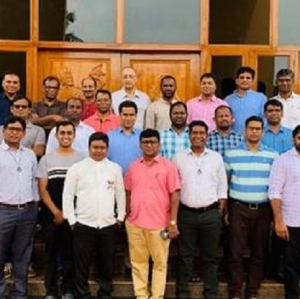Peter MALONE
Joe Bell
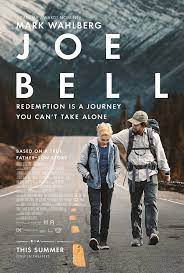
JOE BELL
US, 2020, 93 minutes, Colour.
Mark Wahlberg, Reid Miller, Connie Britton, Maxwell Jenkins, Gary Sinise, Morgan Lily.
Directed by Reinaldo Marcus Green.
One could hardly find a plainer name for the central character of this biographical film. However, the screenplay is based on actual events, an Oregon worker, Joe Bell.
Most audiences will not know Joe Bell story, and so it will be something of a journey of discovery, as we find him involved in a walk across the United States from west to east. He has only himself, a backpack (although well-wishers along the way give him a trolley). And, he is played by Mark Wahlberg, so he seems to be what one might call a 21st century American Everyman.
But, as he walks, he is accompanied by his son, Jadin (Reid Miller), teenage, supporting his father, arguing with his father, appearing and disappearing. This reviewer was rather slower than many audiences in a dawning as to the true nature of Jadin accompanying his father. Something of a shock, in fact, especially in the context of where we realise what is happening, Joe venturing into a gay bar.
Yes, the theme of the film and of Joe Bell’s walk in 2013 is homophobia and bullying. As might be expected, Joe is often too quick off the mark with his emotional reactions, not always understanding well what is going on. Jadin is gay, is bullied at school, takes his life (and the device of his being seen to accompany Joe on the walk, have conversations, challenge his father about his own behaviour, her eventually seeing a bullying episode, means that we are much more aware of and sympathetic to Jadin and understanding his father’s walk).
But, as he walks, Joe takes opportunities to address groups, school children, alerting them to the realities of sexual orientation, a campaign against bullying. While is not the most articulate of speakers, his message is listened to. In the meantime, he is in continual contact with his wife (Connie Britton) and the younger son, Joseph (Maxwell Jenkins), who is also a challenge to his father.
A number of people on the way are puzzled by Joe, engaging conversation with him, learn something about him – and audiences will appreciate a later part of the film where Joe meets a local policeman, played by Gary Sinise, where the screenplay gives them an opportunity for more personal and deeper discussion.
The film invites audiences, especially fathers, to identify with Joe Bell and his experiences, the steps to appreciating his son, challenge to parental expectations, especially in sexual orientation.
American audiences who know the story of this walk will be anticipating the ending. Most audiences, unfamiliar with the story, will find an emotional challenge at the end of the film.
It is interesting to see Mark Wahlberg moving from an action film to a more sympathetic role, a chance to show more humanity. And, also interesting, are the writing and directing credits. The screenplay was written by veteran Larry McMurtry (Lonesome Dove and many westerns) and a long time associate, Diana Ossana (winning screenwriting Oscar with Larry McMurtry for Broke back Mountain). The director, Reinaldo Marcus Green, directed a strong drama about crime in American city streets, Monsters and Men (where those accused of police killings are denounced as monsters whether the case was proven or not). It is well worth seeking out. Green is also the director of the forthcoming King Richard, the story of Richard Williams, father of Venus and Serena Williams.
- Title? A plain American name? A plain American character? An ordinary American man?
- The Oregon settings, the Bell household, home, school? Joe Bell and his walk, across the United States, the variety of states between Oregon and Utah? The musical score?
- The introduction to Joe Bell, Mark Wahlberg, age, tough, gradual revelation of his background, his work, working class, relationship with his wife, his sons, demands on his family, short fuse? Tensions with his wife? His relationship with Jadin? The contrast with his relationship with Joseph?
- Joe, seen walking, gradual revelation of why he was walking, the plan to go from west to east across the US, his campaign, against homophobia? Seen walking with Jadin, their conversations, memories of the past, Joe and his giving talks to any group that would listen, Jadin seen at the back of the hall? The situation of the gay club, the discussion with Jadin, Jadin urging him, Jadin not going in?
- The conversations in the gay club, an opportunity for Joe to reflect on his attitudes, to listen attentively to others?
- The audience realising that Jadin was dead, that he was the reason for the walk, that he was there in Joe’s imagination, memory, his dialogue with his dead son?
- The flashbacks, Jadin, his age, in the house, study, sport, his being bullied, suicidal, the issue of his sexual orientation, acceptance, his father’s short fuse, trying to understand? The impact of the bullying, the visuals, the crowd, and Jadin dying?
- Joe, the phone calls to his wife, memories of the death, bitterness? The coming out to meet him, the time together, Joseph, his relationship with his father, talking? Audiences understanding the pressure of this experience on Joe’s wife?
- Joe continuing his walk, the various people that he met, explaining himself, the school groups, the social groups, people willing for him to speak, to listen? The gift of the trolley for him to carry his wares? His dossing down in various places, determined to complete the walk?
- The encounter with the sheriff, initial suspicions, the sheriff’s character, willing to listen, the discussions, the accommodation? The encounter with the sheriff giving time for the audience to understand more deeply, Joe, his character, his experiences, his motivations?
- The shock of the accident, his death?
- A true story, of 2013, American heritage, a stand against homophobia which has universal interest?
American Oz
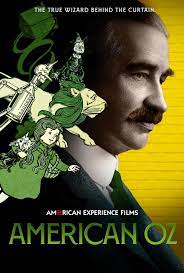
AMERICAN OZ
US, 2021, 112 minutes, Colour.
Voices of JoAnna Reinhart, Michael Stuhlbarg.
Directed by Randall MacLowry, Tracy Heather Strain.
American Oz is a television documentary part of the television series on the American Experience.
The film is trying to do two things at once. The main emphasis is a biography/portrait of American writer, L. Frank Baum, well-known as the author of The Wonderful Wizard of Oz. But, in trying to set Baum in his historical context, the film is also a study of changes in American society, especially from the 1880s to the 1910s.
On the biographical side, there is a lot of information about Baum himself, his family, growing up, his delight in writing, his imagination. He moved around a great deal which gives the film an opportunity for a lot of documentary footage and photos about different areas of the United States in the late 19th century, from open plains to industrial development, small towns, big cities like Chicago. The narration spends a great deal of time and focus on the range of changes, sometimes the rapidity of change, and the differences between frontier life and hardships to city life, and the fruits of success and wealth.
Audiences will enjoy the number of clips from the 1939 film with Judy Garland – some commentary as to how episodes of The Wizard of Oz are reflections of Baum’s experience, of hardship (dramatised in Kansas) but the possibility of taking responsibility for one’s life, following the yellow brick road, and the discovery that the Wizard himself was a phony.
On the one hand, Baum was very liberal in many of his views, especially the influence of his mother in law and his support of the suffragette movement. With his editing a paper in a country town, he had the opportunity write a number of editorials. On the other hand, one of his blindspots was Native Americans, his not considering them as part of his America, his being on the spot with the tour of Chief Sitting Bull – and the massacre of Wounded Knee. A number of his editorials and reflections were prejudicial and racist.
As The Wonderful Wizard of Oz became more popular, more books, big sales, many fans, especially children, Baum went to multimedia to spread the story, and the stories were adapted for the stage, with music. This film includes many excerpts showing the multimedia as well as some stage episodes.
Ultimately, Baum was a success with publishing, made money, travelled widely internationally with his wife, and retired comfortably to a mansion.
To that extent, his life was a personal dramatisation of American Oz.
Father Who Moves Mountains. The
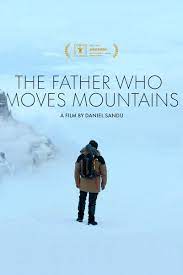
THE FATHER WHO MOVES MOUNTAINS
Romania, 2021, 108 minutes, Colour.
Adrian Titieni, Elena Purea, Judith State, Valeriu Andriuta, Virgil Aioanei.
Directed by Daniel Sandu.
A Romanian film set in breathtakingly beautiful mountain scenery – beautiful but, in winter, potentially destructive.
The film takes place over a week. Firstly, the audience is introduced to a middle-aged man, Mircea, seen with his pregnant wife. Out shopping, he receives a phone call from the police, hurrying home to find that the news is that his son and the son’s girlfriend are lost in the mountains.
The title indicates the intensity of the Father’s intentions, perfectly willing to move mountains to find his son, seen, eventually, digging vigorously in the snow, determined to find his son’s body.
Although the character is not particularly likeable, audiences will begin to dislike him even more as the film progresses. He is commanding, expects all his orders to be immediately obeyed. He meets the man in charge of rescue and search, wants to impose his will about the search, making demands despite hearing of the difficulties in the terrain and the weather. He then calls on his resources, his military connections and personal debts to him, bringing up an extraordinary amount of equipment, suggestions that not all of this is legal, for triangulation to discover the couple’s phones and try to locate them.
Day by day he becomes more intense in his obsession. He is joined by the parents of the young woman who disappeared. His ex-wife comes to the mountains – with the revelation that the son lives with her rather than with his father. Suggestions of guilt which are elaborated on as the film goes on. His pregnant wife also comes. He is impatient with his ex-wife’s religious outlook and prayer. He clashes with his pregnant wife. Eventually, both of them see that he is obsessed and leave the site.
Ultimately, he calls for volunteers, mortgaging his house to his pregnant wife’s dismay, to pay for the volunteers to dig in the mountains with him. The harsh side of his character appears when he refuses to help a woman whose daughter is lost, not willing anyone else to use his equipment. Ultimately, while digging in the snow, and news of another man lost, he does allow his men to go to help and that man is rescued.
The question is whether Mircea is in any way redeemed by his experience, by his obsession, by his ex-wife reminding him of his obsessive guilt even though she has forgiven him, by his continual searching – with a final image of him digging in the snow and the camera rising to show the beautiful mountains which dominate and control human endeavour.
- A film from Romania? The picturesque mountain scenery, the moods of the mountains, winter, snow, avalanches? And a personal drama, obsession, illusion that he could find his son, then that he could dig his body out of the snow?
- The locations, the mountains, the resort and hotel, the details of travelling and working in the mountains, the cable car? The musical score?
- The introduction to Mircea? His pregnant wife, the shopping, her wanting him to make decisions? His distraction with the picture of the stockinged legs? Indication of his past? Revelation that he had been married, divorced, his son living with his ex-wife? The initial part of the film not revealing his background?
- The phone call, the police, the revelation of the disappearance of his son and girlfriend? His going into action, phone calls, identifying the girl, her phone call, identifying her parents? His relying on his assistant, Laure?
- His hurrying to the mountains? The phone call to Paula? Her coming? Meeting the girl’s parents? Meeting Christian, in charge of search operations and rescue? His squad, their experience, testimonies on the wall of the office, skills, equipment?
- The manifestation of Mircea’s obsession, insisting that he go, Christian’s refusal, Mircea becoming more and more insistent, his track, unable to keep up, the return?
- Audience sentiment, empathy with the father searching for a lost son, empathy for the mother who was dependent on her son, empathy for the parents of the missing woman? Yet Mircea’s growing obsession, insistence, stubbornness? His being disagreeable personality? Audience antipathy towards him? Paula and her criticisms, his past infidelities, the divorce, the son living with her? Alina and her criticisms, her pregnancy, her love, but his stubbornness?
- The details of the search, the possibilities, the weather, December, harsh winter, snow falls, avalanches? The limits for the skilled squad?
- Mircea, the revelation of his resources, people in debt to him, the military, military intelligence, his ability to ask for specialised equipment, the questions of its legality? Setting it up, he reliance on Filip and loyalty? On Laure? The trained men, the setting up of the tent, the extraordinary equipment, the triangulation for the phones? Finding the phones, listening to the recordings, the impact?
- The woman whose daughter went missing, her plea to Mircea, his own obsession but his harshness towards her, unwilling to help her? The contrast with Paula and her listening to the woman?
- The team, the individual men, Christian and his reaction, trying to get Mircea to back off, to face the reality?
- Paula, talking with the mother of the missing woman, then blaming the daughter? The effect on the family? The decision to leave? The father, his helping with the digging, finally leaving?
- Paula, her religious beliefs, prayer, the church, Mircea and his lack of belief, tossing away the cross, refusing to go to the church? Paula, realising his obsession, leaving?
- Mircea getting friends, getting volunteers, going to the head of the chairlift, eventually that being refused? The official team, the red markers in the snow? The digging, Mircea and his team, the relentless digging?
- Alina, her leaving? Her return, her love, wanting to support her husband?
- Mircea digging, the information about the lost man, allowing his team to go, the men being saved?
- Paula and her comments about Mircea’s guilt, leaving her, guilt towards his son? Sufficient to explain his obsession, the magnitude and possession of his obsession, leading to an illusion that he would be able to find his son?
- The final image, Mircea digging, the camera rising to show the majesty of the mountains, and that humans fail with the domination of the mountains?
MSC Indian Union, second chapter.
MSC Indian Union, second chapter.
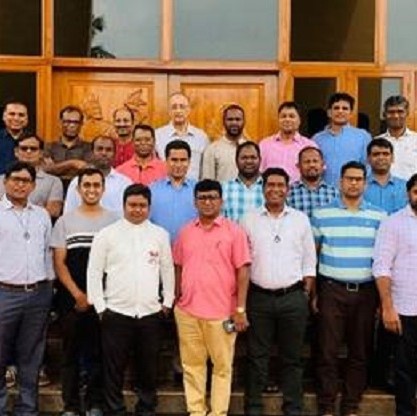
The Australian Province has many ties to the Indian Union – work on the foundation and for many years by Malcolm Fyfe, Australians in the mid and later 1980s, Albert Yelds, Vyn Bailey, Tom Fitzgerald, Michael Fallon, Tony Bolt. And, for many years, Dennis Murphy. Several members of the Union have worked in Australia – and today in Randwick, Kippax and Nightcliff. Every best wish and blessing for the future of the Indian Union.
The Union Report:
The second chapter of the Indian Union began on the 25th of October 2021 at Portiuncula, the Franciscan Renewal Centre situated in a historical city of south India, Mysore. The theme selected for the chapter was ‘United We Serve’. There were 26 delegates as participants and the facilitator was Br. Philip Pinto CFC (a former Superior General of the Christian Brothers). Fr. Thatheus Darwin MSC, the Superior of the Union of India presided over the Holy Eucharist on the inaugural day which was con-celebrated by the council members of the union. He preached his homily on the gospel passage of Mark 10:46-52. He pointed out the hurdles which blind Bartimaeus had to overcome in his pursuit to receive his sight.
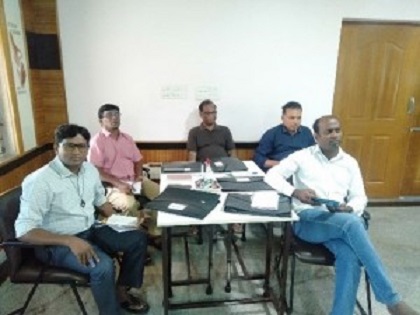
His message at the beginning of the chapter took every delegate to understand the importance of the chapter and the role of each delegate in leading the Union to further pastures of mission to spread the Charism. He advocated for every member to set aside fears and place complete trust and confidence in the Lord in order to have proper sight and insight. After the declaration of the formal opening of the Chapter the delegates had an opportunity to listen to the Superior General Rev. Fr. Abzalon Alvarado Tovar MSC on Zoom. He suggested the chapter to foster deep listening among the members and to consider this chapter as an occasion for proper discernment. He invited all to understand the prophetic nature of a delegate to promote synodality and suggested to be responsible and committed as these play key roles in leading to success.
On the second day, the chapter was blessed with the presence of His Grace Rev. K. A William, the bishop of Mysore. His Lordship celebrated the Holy Eucharist and preached sermon on Synodality and the process of making synodality a reality.

Different groups were created among the delegates of the chapter for the smooth functioning of the program and those groups celebrated the Holy Eucharist on the following days in the mornings with which a day of the chapter was started and the same groups animated the prayer sessions during the chapter. Sports and recreation were also part of the schedule. Various reports such as the Union Superior’s report, report on formation, finance, apostolate, JPIC, education, mission office, and vocation recruitment were presented. The facilitator guided the members to delve into the depths of reality in the presented scenario and to make contributions for further discernment. Plan for the near future, financial stability, brotherhood, and stewardship and a clear sense of direction were a few concerns raised by the members.
Discussions and deliberations were made in order to strengthen the connectivity among members and to improve the network of fraternal relationships. Another area where the chapter looked at was the empowerment of members and making each missionary of the Sacred Heart in India equipped to launch a variety of ministries and to welcome future mission opportunities with great confidence and courage.
Disorientation towards religious life and self-centeredness were pointed out as evils slowly poisoning the vitality of the community life. The need to get connected to nature was also paraphrased and invited all members to promote eco-friendly spirituality and a way of life.
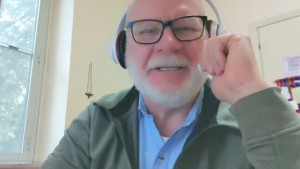
Chris Chaplin Attending the Chapter from Rome
Rev. Fr. Chris Chaplin addressed the chapter members on Zoom on the last day. His message was heart-warming and thought-provoking for the young Indian Union to inculcate evangelical spirit and mission. He stressed the need to make ‘deep listening’ an integral part of the growth of the Union. He appreciated the Indian Confreres working in various countries and thanked each and every member who was pivotal in making this chapter to be a reality.
The Superior of the Union of India announced the great interest shown by the General administration team to work on the process of making the Union a province in 2023. After thanking everybody Fr. Thatheus Darwin made the declaration of the formal closing of the chapter at the evening session on 29/10/2021.
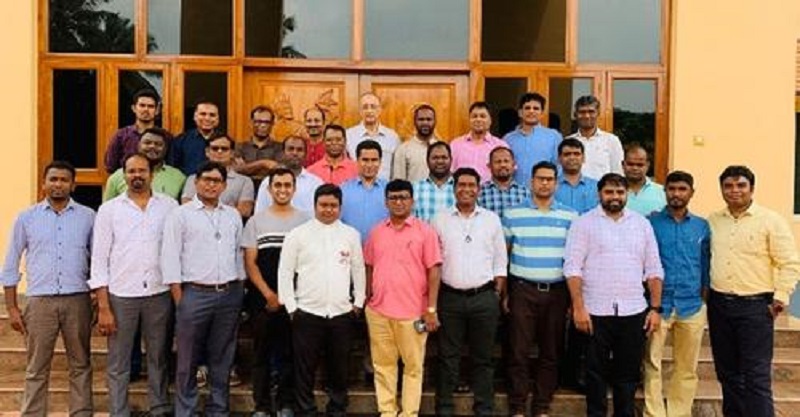
Daronne, La/ The Godmother/ Mama Weed
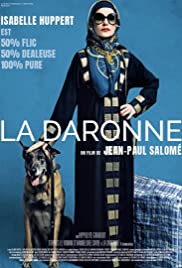
LA DARONNE/ THE GODMOTHER/ MAMA WEED
France, 2020, 104 minutes, Colour.
Isabelle Huppert, Hippolyte Girardot, Farida Ouchani, Liliane Rovere, Iris Bry, Nadja Nguyen, Rebecca Marder, Rashid Guellaz,Mourad Boudaoud.
Directed by Jean-Paul Salome.
Isabelle Huppert has been headlining, top billing, for almost 45 years. And still she goes on, looking much the same in each film, even as she grows older – though, in this one, she does get quite an opportunity to change her appearance. But, she is a reliable screen presence, bringing strengths and variety to each of her films.
It seemed necessary to google the meaning of the title, indicating some kind of slang for a mother figure. The English title, The Godmother (with echoes of The Godfather) does seem a little formal. There is another English title circulating, Mama Weed, which probably does indicate the themes of the film as Well Is the tone.
On the surface, this is a police thriller. Drugs are coming from North Africa, trucks driving through Spain and into France for delivery and distribution. The police are on to different gangs and families, North African based, a lot of surveillance, phone tapping, GPS… And, amongst those working at headquarters is Patience, herself of North African background with family migrating to France decades earlier. She is a widow with two daughters. Her mother is suffering from forms of dementia and is being cared for in an institution, paid for by Patience. And Patience works in the department, listening in to surveillance tapes and translating from Arabic to French.
So far, not so exactly Mama Weed.
At one stage, Patience has to make a decision, especially her concern about the kind aged-home carer who looks after her mother, turning out to be the mother of one of the truck drivers. And the decision has all kinds of unanticipated consequences.
Patience, in fact, is finding it hard to make ends meet, owing substantial rental to her landlady, an imperious Chinese landlady, Patience mother being threatened with eviction from the home for financial reasons…
In some ways, we suppose, the screenplay is indirectly asking us what we would do in a similar situation, protecting the kind carer, the consequences with the drug load in the truck, diverting the drugs to save the driver, and the interesting challenge as to what to do with such a huge haul of drugs!
Well, the title does indicate that Patience is going to become Mama Weed – using her considerable wits, to locate the drugs, buying a former sniffer dog as a companion and accomplice, set up the very contacts that the police are keeping on surveillance. And, the big chance for Isabelle Huppert to appear not exactly like herself, donning very fashionable Arabic clothes, headscarf, dark glasses, for her rendezvous.
There is also another complication, she is beginning a fond relationship with the police chief in charge of operations and surveillance, his becoming more and more frustrated. And, there is quite some tension in the action, and then thugs invade a Chinese wedding, hosted by the landlady (who, of course, become something of an accomplice), and there are shootings and bodies to be disposed of!
We are in admiration for Patience and her skills – but, this is a moral/amoral world and we have to check what our attitudes are has Patience literally sails off to a new life.
- Police thriller? Drug crimes? Imports and dealers?
- Drug dealing thriller, the twist with Patience, her story, her mother and care, financial difficulties, translation work, the decision about the drugs, her skill in dealing?
- The Paris settings, the police precincts and interrogation rooms, apartments and apartment blocks, the streets, restaurants, cinemas, ordinary Paris life? The musical score?
- The background of the drug deals, input from Africa, tracks through Spain, into France? The distributors in Paris? The various families? Brutal competitiveness?
- The police, the leads, tracking devices, recording phone calls (the tone of the opening credits)? French and Arabic? Patience as translator? The range of staff, officials, police on the beat? Philippe in charge? Scenes of interviews, the dealers, their arrogance, spitting at Patience…?
- Patience, her life, from Africa, memories of her father and survival, her mother and her physical deterioration, in care, her behaviour, touches of dementia, being treated as a Princess by the staff? The two daughters and their work, support of their mother? Patience and her work, language skills, typing up reports? Her visits to our mother, exasperation? Her reliance on Khadija? The manager of the home wanting to evict her mother? Her owing money to the landlady?
- Patience and her relationship with Philippe, the attraction, the meetings, the outings, shared discussions, the possibility of a future?
- Patience listening to the driver, realising who he was, the plan, the talking with Kadija, the information about the drugs? Her mistranslations? Her plan, the funds, the driver’s mother, his viewing of the road, destroying his phone, the police and the tracking devices? The mystery as to location of the drugs?
- Patience, her plan, her adopting the narcotics dog, getting the map, working out where the drugs could be hidden, using the dog? Finding the site, transporting the drugs home, the basement room, going back for more?
- The arrest of the drug dealers, the getting out, the search for the drugs?
- Patience and her contact with the dealers, their ordinariness, the plans, the agreements, the variety of meeting places, the prison, the shops, the supermarket, the cinema…? The exchanges, Patience buying the money counter?
- Patience, her disguising herself in Arabic clothes, changing her manner and style, tough dealings?
- Paying the home for her mother, money to Kadija, paying the landlady? The landlady and her shrewdness, sensing money and drugs, offering to do the money laundering?
- Patience and the dangers, thugs following her, the police, the Chinese wedding, the intrusion the thugs, the guns and the shootings, the landlady clearing everything up?
- Philippe, exasperation at losing the criminals, Patience and her work as translator, getting information, avoiding some translation, her fainting? Her being caught on camera, Philippe and his telling Patience that the dealer was of the same build as she?
- The decision to stop the deals, returning some of the drugs to the initial hiding place? The death of her mother and its effect? The pathos of the scenes between them, antagonism, her mother’s memories of the past, the photo in the boat when she was young? The daughter’s and the stories of their mother and grandmother taking them shopping? The comic touch with the distribution of the ashes in the apartment store near her favourite departments?
- The deal with the landlady, the money from the sale of the apartment? Packing up, Philippe and his last visit, his regrets? Suspicions and Patience having an answer for everything? The landlady’s offer of the job, her going to Africa and future sales? Her sailing in the boat and its name?
- How sympathetic character was Patience, sympathy for her situation, admiration of her shrewdness – a kind of moral/amoral character and behaviour?
I am not a Witch
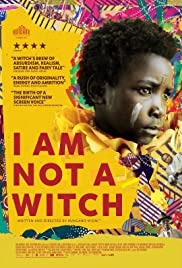
I AM NOT A WITCH
UK, Zambia, 2017, 85 minutes, Colour.
Maggie Mulubwa, Henry B. J. Phiri.
Directed by Rungano Nyoi.
The setting for this film is Zambia. The director was born in Zambia but left at an early age and grew up in the United Kingdom. This film has won many awards, many nominations, especially in the UK.
Audiences will have a response to witches – especially as they see the tourists in their bus, going to look at the witches, middle-aged and elderly women, faces painted, sitting in rows for observation. The witches are then sent out in the fields, working hard, but always with a ribbon of their back leading back to a winch, able to control all their movements. However, they live in some kind of camaraderie and community.
The focus of the film is on a young girl, no explanation of her origins, being interrogated by the police, condemned by people as a witch. She is offered the option of choosing to be a witch or a goat. She chooses to be a witch and goes out into the feels, ribbon attached.
However, a government official takes a liking to her, using her and her alleged powers in lineups to decide who is the guilty party (the young girl phoning her grandmother for advice: the most nervous -looking). The young girl is good at this work, accepted by the official, taken to visit his lavish home, even going on a television talk show.
However, the young girl is oppressed – and makes the final decision to become a goat rather than a witch, which leads to her death.
The film serves as a metaphor for the treatment of women in society, with particular focus on African society and witches. It also serves as a metaphor for the abusive and oppressive treatment of children.
This is the 21st-century, with many dark traditions from the past, the status of women, but in the modern era everyone with their mobile phones, even the young witch, headphones and music, modern farming equipment – and even a talk show where the government official and the young witch are interrogated.
- Audience response to the theme of witches? Western traditions and persecutions? Fears? Women? African traditions, witch doctors, the treatment of women named as witches?
- The title, the focus on the big number of witches, on Shula?
- The Zambian setting, the location photography, out in the fields the roads, the homes? The confines for the witches? The contrast with the lavish mansion and furnishings? The television studio? Zambia in the 21st-century? The musical score?
- The tourists visiting the witches, the ironic comment on tourist curiosity, exploitation of the women? The large number, painted faces, sitting in rows?
- The treatment of the witches, named as witches, their ages, going to work in the fields? The significance of the ribbons? On their backs? Tied to the winches? Controlling their movements, even at work? The women and their acceptance of this? The community, camaraderie?
- Shula, the little girl, the question is, the interview with Inspector Josephine, the witnesses against her, the people outside the window condemning her? Her being taken, the ribbon, control, with the other women? At work?
- Mr Banda, a government official, his interventions, the role of the witch, becoming his protégé, protecting her, her privileges, yet the control, the ribbon? In the case, ringing her grandmother, the criteria for judging the criminal? Her decision, the man and his reaction, travelling on the bus, condemnation?
- Mr Banda, his satisfaction, taking Shula with him, her growing confidence? The lineup and her picking the criminal?
- The visit to Mr Banda’s house, the woman, living in comfort, her explanation of her history, acquiescing in everything asked of her, still controlled? Her support of Shula?
- The irony of the television appearance, the talk show, the questions, the audience, Mr Banda making a good impression about himself, Shula silent?
- The effect of the experience, the previous option of being a witch or a goat, her deciding that a goat would have been better, even if eaten as threatened?
- Her final choice, her death, the women finding her, the red clothes, mourning her?
- The comment on the role of women in this Zambian society? Women subservient, witches, working in the fields? The young witch, a metaphor of the oppressive and abusive treatment of young girls?
Those Who Wish Me Dead
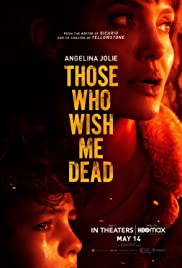
THOSE WHO WISH ME DEAD
US, 2021, 100 minutes, Colour.
Angelina Jolie, Finn Little, Nicholas Hoult, Aidan Gillen, Jon Bernthal, Medina Senghore, Jake Weber, Tyler Perry, Tory Kittles.
Directed by Taylor Sheridan.
Certainly an arresting title. And it is interesting with the opening of the film to identify the Those of the title, two respectable -looking but deadly-sadistic hitmen. And then it is interesting to identify who is the Me of the title. A 12-year-old boy.
And the tone for a thriller is set as the two assassins, allegedly working for a finance company, insinuate themselves into a mansion – which then blows up. Villains clear – motivation to be revealed. And, it is revealed very quickly, a situation where an accountant has exposed irregularities and the corporation bosses are out to eliminate him. The accountant is played by Jake Weber and his son, very effectively, by Finn Little, from Brisbane, who was the star of the remake of Storm Boy. Finn Little has to work with Angelina Jolie and, in a sense, bear the burden of the pursuit drama – and he does.
But, to make the thriller more intriguing, the main settings are in the state of Montana. Almost 70 years ago there was an action thriller called Red Skies of Montana, the mountain and forest fires of that state. And, they featured here, some very effective sequences of large, fierce and raging fires. And, we are introduced to the firefighters, especially the fire jumpers who parachute into dangerous situations. The old brigade stand around yarning with all kind of banter – focusing on Hannah, tough, hard-working, but tormented by memories and nightmares of a past episode, her misjudging the direction of the wind and the fire, some young boys dying in the flames. Hannah is played by Angelina Jolie.
The other important characters in the film are the local sheriff and his wife, pregnant wife (Jon Bernthal and Medina Senghore).
The screenplay blends the themes of the hitmen pursuing the boy, Hannah and her work and problems, the inevitable crime against the father and son and the sheriff and his wife being caught up in the action. There is ambush and machine-gunning, car crashing, the hitmen lighting a fire and its raging, Hannah and her work in a remote tower, the escape of the boy and his bonding with Hannah.
The hitmen are particularly alienating. Aidan Gillen is the ruthless older brother, no compunction whatsoever. Nicholas Hoult (once a chubby boy in About a Boy, now and gangly six foot three) looks as if he ought to have compunction – but does not. The pursuit is relentless, even involving the sheriff, a confrontation with his wife, who can be as tough as the men.
The film has been written and directed by Taylor Sheridan who has a strong reputation for action films in the rather wilder states of the union, Wind River and Hell or High Water.
It is easy to note some implausibility in the plot development and detail, but that is not the point – the point is a night out for an exciting action show, which it is.
- The title? The assassins? The targets? Connor?
- The ingredients of the plot: business and criminality, the assassinations, the flight of father and son, the firefighters in Montana, the sheriff and his pregnant wife? All coming together?
- The Florida openings, the lavish homes, the explosion? Jacksonville, father and son, the drive? The contrast with Middle America and scenery? Montana, the open plains, the mountains, Continental Divide, the towns? The musical score?
- Jack and Patrick, the others, hitmen, disguise, the house, the setup, the explosion, travelling to Jacksonville? Further intentions, the empty house? Looking at the photos, the clue for the survival camp in Montana? Their driving, their technology, information from the licenses of cars, the ambush, shooting at the father and son, the machine guns, the crashing of the car, further down the hill? The passing motorist offering to help and their shooting her? The pursuit of the boy, the sheriff’s home, threatening his pregnant wife, her turning the tables and burning Jack? The confrontation with the sheriff, shooting the older man? Getting the sheriff to help them in tracking down the boy? Going to the fire tower, with the sheriff, his going up, the shooting? The escape, Jack and the confrontation with the sheriff’s wife, her killing him? Patrick, the pursuit of Hannah and Connor, her attacking him, his being burnt?
- Fire, Jack setting the fire as a distraction, the immediate spread, the power of the fire?
- The background of the financial deals and mismanagement, Jack meeting Arthur at the airport, his strong presence in demands?
- The sheriff, discussions with his boss, doing his duty, the past with Hannah, warning her, her stunt with the skydiving, at home, his pregnant wife, their becoming involved in the search? The fire, the masks, his wife surviving, his death?
- The firefighters, the visuals of the skydiving, the graduation class, the veterans and their joking around, Hannah and her place, the stunt, reprimand from the sheriff? Her going to the tower? The memories of the past, her misjudging the wind, the three boys killed in the fire? Her being tormented, blaming herself?
- Connor, the death of his father, his father urging him to go to the creek, leading to a town, his encountering Hannah, suspicious, with the message his father wrote for him, to find someone trustworthy? Their time together, the town, no phone because of the lightning strike, the arrival of the assassins, the shooting, Hannah and Connor, the confrontation with Patrick, his death, hiding in the creek, surviving? Connor’s future, Hannah helping?
- Hannah, in a fire with a young boy, the memories of the past, saving him this time?
- The rescue, the action taking place over a few days? Popular ingredients for a thriller?
Cliff Walkers, The
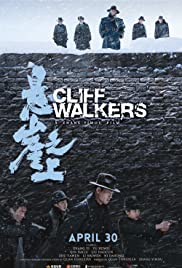
THE CLIFF WALKERS
China, 2021, 125 minutes, Colour.
Zhang Li, Yu Hewei, Zhu Yahwen.
Directed by Zhang Yimou.
In recent decades the Chinese film industry has produced a great number of films about the experience of China in the 1930s, the invasion by the Japanese and their occupation, harsh government, installation of puppet local authorities, atrocities and executions, leading up to such events as the siege of Nanking and the outbreak of World War II. This is acknowledged at the beginning of this film – and, at the end, there is an encouragement for the Revolution.
This film is set in 1931, winter, many of the sequences with snow falling. Four Chinese who have been undergoing training in Russia are parachuted in for a mission, to find an escapee from a Japanese torture camp and get him over the border so that the world can discover what the Japanese are doing.
The four, two men, two women, decide to go in pairs, taking suicide tablets with them.
With the espionage dimension of the screenplay, audiences have to pay quite a deal of attention, the journeys of the two pairs of spies, the local commander and his assistants, the intricacies of infiltration, cover, betrayals.
It is interesting to look at some of the details of Chinese life at the time, an extensive ride in a train, the station and railyards, a city and its streets (often at night, dark alleys, car chases and crashes), the bright neon lights, especially for the local cinema, Cinema Asia (where Charlie Chaplin’s The Gold Rush is screening and we are treated to some glimpses of its most famous scene, Charlie and his shoes), the Romanian embassy and its lavish interiors.
The characters of the four spies gradually emerge, Zhang, the leader, along with the young woman, travelling by train, accosted, framed by the authorities, a safe house, but Zhang arrested and tortured, physically and with psychedelic drugs.
There is drama with a grim sequence initially of prisoners lined up and casually shot, one tortured and pressurised into betraying the other members of the group. The commander is bullish and relentless. However, gradually one of his closest assistance is revealed as being part of the operation. This leads to tension, visiting the cinema, the revealing of the plan, the involvement of the Romanian embassy, betrayal, pursuits, suicide pills…
There is some relief at the end, some moments of sentiment and happiness and hardened viewers and reviewers might be wondering what the director is up to, indulging in feelings. However, during the final credits, there is a sequence where no doubt is left about espionage, betrayals, retribution.
Director, Zhang Yimou, has been making some key Chinese films for over 30 years, beautiful historic dramas in the 1990s, some very personal stories also, then a move into action features, history, martial arts – and his being the director of the opening of the Beijing Olympic Games.
- The history of China? The 1930s? The Japanese invasion and occupation? Puppet governments, resistance? Training in Communist Russia, espionage?
- The work of the director, the long career, his ability with personal stories, historical stories, warfare, action spectacle?
- A patriotic film? Encouragement of the Revolution?
- The background, the occupation, the antagonism between Japanese and Chinese, the Japanese domination, imprisonment, torture camps, executions? Chinese society in the 1930s? The towns, buildings and offices, the cinema (and The Gold Rush with an excerpt of the famous shoe seen)? Shops, the neon lighting? The trains, the carriages, stations? The Romanian embassy and its interiors? The night sequences, the dark, the streets, the car pursuits and crashes?
- The season, so many sequences with snow falling, the cold? The musical score?
- The group, in the snow, coming from Russia, the suicide tablets, their deciding to separate?
- The complexity of the group arriving, splitting, their destination in the town, the Operation, the escape prisoner from the camp, to identify him, rescue him, get him over the border, to alert world opinion about the Japanese prisons and treatment?
- The delineation of each of the four characters, the men, the women? The older couple, the relationship, their children remaining in China, later seeing the boy begging and running with the money, and the children finally reconciled with their mother?
- The young woman, travelling on the train, separated from Zhang, her continuing on, shrewdness, the pursuit in the rail yards, evading capture, guns and shooting? Her getting to the safe house? In the town, the code messages, and memorising them, going to the cinema?
- Zhang, his leadership, control, in the train, the interview with the official, the couple, their documents, the official substituting false documents. the attempted arrest?
- His continued activities, his being taken, the details of the torture, electric shock, the psychedelic drugs? His attempted escape, the assistance of Zhou, the pin and the handcuffs, the car? The confrontation, his being taken, his death?
- Zhou, long years on the staff with the commander, Communist, spy, his helping the group, his being present and witnessing the torture? His help, and Jin as his assistant, the use of his car, defending him to the commander, yet his being set up as a scapegoat? (Jin, suspicions, in the shootout, the gun, his being arrested, tortured, executed?)
- The commander, his manner, the callous staff, enjoying the torture, the executions and the alcohol and spraying the victims? Casually shooting them?
- The businessman, about to be killed, spared, his talking, present with the commander, going into action, the betrayal?
- The codes, the group in the safe house, the drugs, pretence, misinformation? The woman and the food poisoning?
- The cinema, Zhou ticking the screening time, checking Jin, the young woman seeing it, going to the cinema, getting the orders from Zhou?
- The irony that the code was for a later rendezvous, going to the Romanian embassy, the woman, walking through, the car, the pursuits, the crash and in the street, her escape? Her accomplice, the car, the embassy, the pursuit, the confrontation with the issue, the guns, ammunition, his taking the poison tablet?
- Zhou, under suspicion, being held, released, embraced? Maintaining his cover?
- Sentiment at the end, bringing the children to the mother, Zhou and the young girl watching, the mother and the reconciliation?
- The credits sequence, the jolt to the sentiment with mother and children, Zhou and the vicious wrangling of the traitor in the car?
- The overall impact, some understanding of Chinese history, the 1930s, and the relevance to 21st-century China?
Think Like a Dog
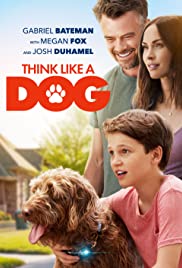
THINK LIKE A DOG
US, 2020, 91 minutes, Colour.
Gabriel Bateman, Josh Duhamel, Meagan Fox, Madison Horcher, Kunal Nayyer.
Directed by Gil Junger.
Fantasy film with an emp1.hasis on science for young students at school and an emphasis on friendships with China which targets the young audience, and the family audience.
Gabriel Bateman plays Oliver, a genial young student at school, keen on scientific experimentation and winning the science fair at school. He is also shyly infatuated with a young girl at school, Madison Horcher. He also has a bullying rival. There are scenes of him at school, rehearsing Romeo and Juliet and substituting the young girl’s name for Juliet… He is also fond of virtual reality games, teaming up with a friend from China.
He also has a pet dog, Henry, who has a very broad comic American accent. In his main experiment, setting up magnetic fields in order to read thoughts, he finds that his head brace worn on Henry enables them to converse. He shares this with his friend in China – but the energy goes through a circuit with a satellite raising international investigations.
Then there are Oliver’s parents, Josh Duhamel and an unconvincing Megan Fox, preparing for a separation, Oliver naturally highly upset.
A guest at the science fair, Kunal Nayyer, is a hero but proves to be something of a dastardly villain who is finally unmasked. The international investigators show greater appreciation for Oliver and his work and relocate him and his parents who are now reconciled, the bully also changing heart and Oliver united with his girlfriend.
Easy come, easy go.
Locked Down
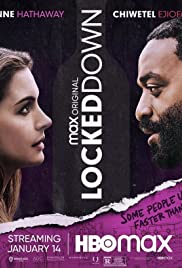
LOCKED DOWN
UK/US, 2021, 118 minutes, Colour.
Anne Hathaway, Chiwitel Ejiofor, Dule Hill, Mark Gattis, Ben Kingsley, Ben Stiller, Sam Spruel, Stephen Merchant, Mindy Kaling, Claes Bang, Lucy Boynton.
Directed by Doug Liman.
Locked Down are probably two of the most used words throughout the world in 2020. Audiences looking at the title would be aware of their own experiences of lockdown and possibly curious to see a film on this theme.
Anne Hathaway and Chitiwel Ejiofor portray Linda and Paxton, a couple together for 10 years, he British, she American, their having met in their wild Dakota days but now living in London. In fact, this is a very London film, where the couple are experiencing lockdown in an apartment block in a street in the west of London.
The first 20 minutes or more of the film make audiences experience something of lockdown and their memories of being confined. Whether that was exactly a wise dramatic move is open to question, some audiences rather unwilling to be in lockdown again, even watching a movie about lockdown. A lot of dialogue, a lot of the interaction between Linda and Paxton, their feelings of alienation and irritation with each other. And, of course, up comes Zoom, Paxton checking with his half-brother in New York, and many audiences remembering their Zoom and Skype conversations and communication.
So, where could this drama be going? Perhaps not far because of lockdown!
What emerges is that Paxton has something of a criminal background and is employed as a truck driver – with a cameo by Ben Kingsley at his comically sinister boss, religious but also rather bent according to the law. There is a big job coming up because, as we remember, minimal shopping during lockdown and big stores, especially Harrods which becomes one of the stars of this film, has very valuable merchandise which needs to be transferred into safe storage. This is not quite according to the law for Paxton so his boss gets him a pass under the name of Edgar Allan Poe!
Meanwhile, we discover that Linda is a powerful executive, has worked for five years at Harrods, is moving up in the world of administration. And her company is invited to supervise the transfer of goods from Harrods to the storage. And, and here the screenplay moves into the realm of thriller, a possible heist, there is a £3 million diamond to be transferred.
Temptation!
The latter part of the film is more dramatically interesting, of course, and the continued to and froing of the moral issue, to steal or not to steal. There is Linda’s motivation and the solving of all financial problems. There is Paxton’s motivation, especially in some reconciliation with Linda.
One of the advantages of the film is that quite a number of character actors turn up in cameos, some quite unexpectedly. Ben Stiller turns out to be the boss on the other end of zoom in Vermont with his rebellious son mocking him behind his back (played by one of Ben Stiller’s sons). Then there is Stephen Merchant doing a Stephen Merchant gawky cameo, Mindy Kaling being quite genial. Lucy Boynton works at Harrods. And, especially, there is Mark Gattis as Donald, one of those executives whom Linda has to fire – on zoom! He turns up at Harrods at the moment of the dilemma of whether to take the diamond or not.
And, for audiences who want to know whether they will steal the diamond or not, they have to remain right to the end to get the answer. (Some who found the early part of the film difficult have not wanted to be lockdowned right until the end of the film.)
- A covid pandemic movie, title, the world experience of 2020, 2021? Audiences able to identify with the basic theme?
- The London setting, the streets and buildings, flats? The empty streets? Cars and buses? The focus on Harrods, exteriors, the interiors, the departments, the basements? The musical score?
- The pace of the film, the early part of the film involving the audience in an experience of lockdown, two people together, tensions, dialogue, Paxton going into the street with his poems, Linda and her exasperation? The importance of Zoom, Paxton and his discussions with his half-brother, his girlfriend? So much 2020 communication via Zoom?
- Paxton, his background, gangs, crime, prison, rehabilitation, truck driving? Relationship with Linda, the years, exciting times indicated? Living on his memories? The contrast with Linda, American, in love with Paxton, over the years, her professional skills, her firing people over Zoom? Her relationship with the bosses? Possibilities for promotion?
- The pandemic situation in the first half of 2020? Lockdown, shops, Harrods, the need to transfer goods from the store? The trucking company? The offer of a job to Paxton? His boss, religious inclinations, yet shady dealings? Martin at the depot, cantankerous, hostility towards Paxton? Phoning the authorities?
- Linda, growing exasperation, firing people, her boss in America and his callous attitude, and his son poking fun at him on Zoom? The job of transferring the goods from Harrods? Her responsibility? The issue of the Harris Diamond?
- Paxton, his bike, selling it, his half-brother on the phone, buying it, Linda cut him off, her buying the bike and giving the money back to Paxton?
- The beginning of the plan, Linda and her attitude, the speculation, her being anti the firm, the discussion with the executives? Putting it to Paxton? Hesitations? Moral issues, keeping it on the level of speculation, decisions during the event?
- The day, going to Harrods, the pass for Edgar Allan Poe, Linda being welcomed back by the staff, are using this to get Paxton inside? The food court, the picnic on the roof? The decisions and indecision?
- The moment, comparative ease, the diamond and taking possession of it, taking the false diamond from the display? Their making their escape, the call for Edgar Allan Poe – and the irony of why he was being called? Their getting out?
- Donald, his being sacked, the effect, his being at Harrods, their explaining the situation to him, his being on side, anti-authority?
- The pandemic film, the experience worldwide 2020, a setting for a heist movie, the finger to authority?
